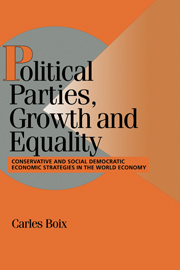 Political Parties, Growth and Equality
Political Parties, Growth and Equality Published online by Cambridge University Press: 05 June 2012
One of the most striking developments in the discipline of political science today is the extent to which the research on democratic politics and performance and the literature on political economy are at odds with each other. On the one hand, political scientists have managed to accumulate an impressive array of knowledge and models on political participation, the formation of voter attitudes, electoral behavior, and partisan competitive strategies that provides very powerful insights on the workings of modern mass democracies. On the other hand, however, political economists have downplayed the significance of voter preferences and partisan programs to explain policies and economic outcomes. Until the early 1980s, corporatism, that is, the continuous bargaining among organized economic interests, was offered as the paradigm of how politics was (or ought to be) conducted in most parts of the advanced industrial world. Several scholars then turned to the analysis of the state and its political institutions to account for the notoriously different levels of inflation and budget deficits that the OECD countries experienced in the aftermath of several consecutive oil shocks. Today many have decided that globalization and economic interdependence are finally washing out any differences that may remain among nations. What all these research agendas have in common, however, is the rather tangential role they have ascribed to electoral politics and the impact of partisanship.
This study does not try to overturn all these explanations. Domestic institutions and the various constraints imposed by the international economy are clearly needed to understand the different political–economic equilibria that characterize advanced countries.
To save this book to your Kindle, first ensure no-reply@cambridge.org is added to your Approved Personal Document E-mail List under your Personal Document Settings on the Manage Your Content and Devices page of your Amazon account. Then enter the ‘name’ part of your Kindle email address below. Find out more about saving to your Kindle.
Note you can select to save to either the @free.kindle.com or @kindle.com variations. ‘@free.kindle.com’ emails are free but can only be saved to your device when it is connected to wi-fi. ‘@kindle.com’ emails can be delivered even when you are not connected to wi-fi, but note that service fees apply.
Find out more about the Kindle Personal Document Service.
To save content items to your account, please confirm that you agree to abide by our usage policies. If this is the first time you use this feature, you will be asked to authorise Cambridge Core to connect with your account. Find out more about saving content to Dropbox.
To save content items to your account, please confirm that you agree to abide by our usage policies. If this is the first time you use this feature, you will be asked to authorise Cambridge Core to connect with your account. Find out more about saving content to Google Drive.